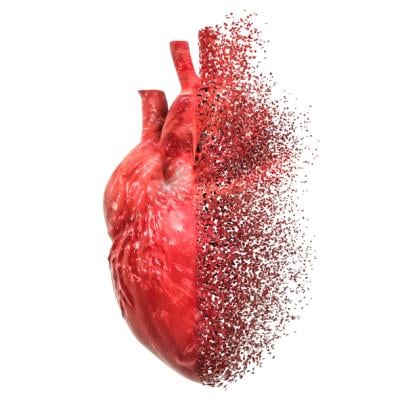
Getty Images
March 1, 2023 — Mesoblast Limited, global leader in allogeneic cellular medicines for inflammatory diseases, today announced publication of the DREAM-HF Phase 3 trial results in the premier peer-reviewed journal for cardiovascular medicine, the Journal of the American College of Cardiology (JACC). The results of the randomized, double-blind, controlled study in 537 patients showed that Mesoblast’s mesenchymal precursor cell therapy (MPCs; rexlemestrocel-L) strengthened heart function at 12 months, as measured by left ventricular ejection fraction (LVEF) and decreased cardiovascular death, myocardial infarction (MI) or stroke in patients with chronic heart failure (CHF) due to reduced ejection fraction (HFrEF) over a mean follow-up of 30 months.1
DREAM-HF’s lead investigator, Dr. Emerson C. Perin, MD, PhD, FACC, Medical Director at The Texas Heart Institute, said, “The cells appear to work by reducing inflammation, increasing microvascular flow, and strengthening heart muscle. Locally, in the heart, the MPCs can protect cardiac muscle cells from dying and can improve blood flow and energetics. In large blood vessels throughout the body, the reduced inflammation resulting from the activation of MPCs may decrease plaque instability, which is what leads to heart attacks and strokes. The cells seem to have a systemic immune modulatory and anti-inflammatory effect.”
“MPC therapy could change the future of cardiovascular care for patients with heart failure due to inflammation,” according to Dr. Joseph G. Rogers, CEO and President of The Texas Heart Institute and advanced heart failure specialist.
The study enrolled patients across 51 sites in North America and the results showed that a single intra-myocardial injection of 150 million cells of rexlemestrocel-L:
- improved LVEF from baseline to 12 months to a significantly greater extent than controls across all patients with available echocardiograms (p=0.021), with maximal benefit seen in patients with active inflammation as measured by the presence of baseline hsCRP ≥2mg/L (p=0.008)
- reduced risk of MI or stroke by 57% (HR 0.43; 95% CI [0.23, 0.78]) in all treated patients compared with controls
- reduced risk of MI or stroke by 75% (HR 0.25; 95% CI [0.09, 0.68]) in patients with inflammation (baseline hsCRP ≥2mg/L) compared with controls
- reduced risk for time-to-first Major Adverse Cardiac Event (MACE), defined as cardiovascular death, MI or stroke, by 28% (HR 0.72; 95% CI: [0.51, 1.03]) in all-treated patients compared with controls
- reduced risk for time-to-first MACE by 37% (HF 0.63; 95% CI: [0.39, 1.02]) in patients with inflammation (baseline hsCRP≥2mg/L) compared with controls
- did not further reduce the frequency of recurrent hospitalizations for worsening HF symptoms when added to maximal standard of care medicines for heart failure.
“These provocative results may usher in new directions for the field of cell-based regenerative therapies in the coming decade,” stated PV Johnston et al commenting on the DREAM-HF results in a recently published2 review in American Heart Journal Plus: Cardiology Research. “Using the knowledge gained from DREAM-HF along with the trials that preceded it, the potential for breakthrough cell-based therapies for heart failure in the coming decade is immense.”
“We are very encouraged by these study data that indicate the potential of our allogeneic cellular therapy to address the major areas of unmet need in heart failure patients where conventional treatments are not effective,” said Mesoblast CEO Dr. Silviu Itescu. “Improvement in LVEF at 12 months may be a functional surrogate endpoint for rexlemestrocel-L’s subsequent benefits on long-term MACE outcomes and survival in this high-risk patient population with chronic heart failure.”
“These findings suggest an important mechanism of action is the anti-inflammatory effect of MPCs, but perhaps more importantly, these effects are systemic and not limited to their site of delivery in the heart,” added PV Johnston et al. “The results of DREAM-HF suggest those patients with heart failure with preserved ejection fraction (HFpEF) and other cardiomyopathies could potentially benefit from MPC therapy as well. The results of DREAM-HF in this way mirror the prior Cardiothoracic Surgical Trials Network studies of intramyocardial MPCs in left ventricular assist device (LVAD) patients.”
In an earlier randomized, controlled trial in 159 patients with end-stage chronic HFrEF, inflammation and LVAD implantation, a single intervention with rexlemestrocel-L injected directly into the left ventricle at the time of LVAD insertion resulted in significantly reduced cumulative incidence of life-threatening non-surgical major mucosal bleeding events requiring hospitalization through 6 months (GI or epistaxis) compared with controls (p=0.02).
Mesoblast plans to meet with the US Food & Drug Administration (FDA) next quarter under its existing regenerative medicine advanced therapy (RMAT) designation to discuss common mechanisms- of-action across the spectrum of chronic HFrEF patients from NYHA class II/III to those with an implanted LVAD, and potential pathway to marketing approval.
For more information: www.mesoblast.com
References / Footnotes
- Perin EC. Et al. Randomized Trial of Targeted Transendocardial Mesenchymal Precursor Cell Therapy in Patients With Heart Failure. JACC Vol. 81, No. 9, 2023. https://doi.org/10.1016/j.jacc.2022.11.061
- Johnston PV. et al. Dare to Dream? Cell-based therapies for heart failure after DREAM-HF: Review and roadmap for future clinical study. American Heart Journal Plus: Cardiology Research and Practice 13 (2022) 100118. https://doi.org/10.1016/j.ahjo.2022.100118
- AHA’s 2017 Heart Disease and Stroke Statistics
- Ponikowski P., et al. Heart Failure: Preventing disease and death worldwide. European Society of Cardiology. 2014; 1: 4-25
- Gustafsson F, Rogers JG. Left ventricular assist device therapy in advanced heart failure: patient selection and outcomes. European Journal of Heart Failure 2017;19:595-602.
- United Network for Organ Sharing
- Agency for Healthcare Research and Quality – Healthcare Cost and Utilization Project – Claims Analysis ICD- 37.6.
- Data on file
- Chatterjee A, Feldmann C, Hanke JS (2018) The momentum of HeartMate 3: a novel active magnetically levitated centrifugal left ventricular assist device (LVAD). J Thorac Dis 10 (Suppl 15): S1790-S1793.
- Mehra, MR Salerno C, Cleveland JC (2018) Health care resources use and cost implications in the MOMENTUM 3 long-term outcome study: a randomized controlled trial of a magnetically levitated cardiac pump in advanced heart failure.


 February 03, 2026
February 03, 2026 









